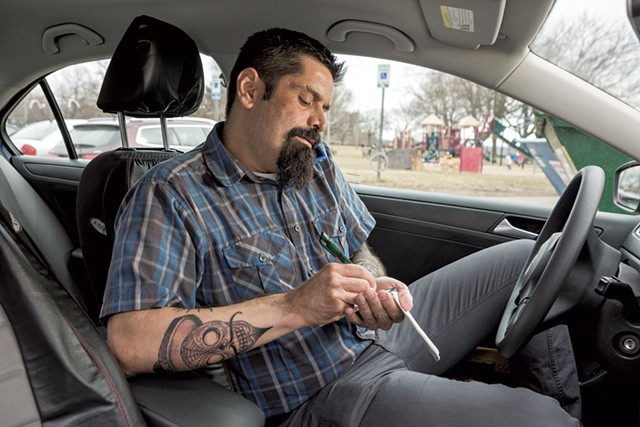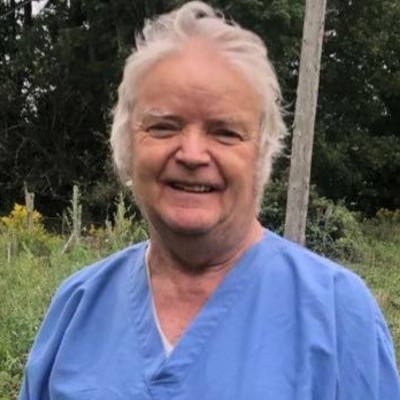Published April 16, 2014 at 10:00 a.m.
Justin Verette is a first responder at the Burlington Police Department, but you won't see him in a uniform, behind the wheel of a cruiser or packing a gun, Taser or nightstick. His supervisors were initially uncomfortable with the idea of him even carrying a police radio, but it's a requirement of his new job as a clinical interventionist for the BPD.
"Some people were asking, 'Are you undercover?'" Verette said. "I had my tires slashed — somebody thought I was a narc."
But most people, including cops and city officials, are celebrating Verette's new role. Prompted by the fatal police shooting of a mentally ill man in Burlington's New North End last November, dispatchers for the past few months have sent Verette — sometimes alone, sometimes accompanied by uniformed officers — to respond to 911 calls that involve mentally ill or distressed subjects.
The pilot program, which is an outgrowth of the HowardCenter's Street Outreach Team, attempts to reduce danger in the encounters between police officers and people in psychological crisis. Earlier this month, a Leicester man shot at and injured two Vermont state troopers. The suspect was reportedly mentally ill.
"I think it will make a difference," Burlington Police Chief Michael Schirling said of the new approach.
The BPD had been moving in the direction of civilian intervention well before officers killed Wayne Brunette when he approached them with a shovel outside his home last November — the first police shooting in Burlington since 1997. For almost 15 years, the police have been working with the HowardCenter's Street Outreach Team to resolve conflicts that involve people suffering from mental illness, substance abuse and other issues, mostly on and around the Church Street Marketplace. The mental-health workers interact with between 700 and 1,000 troubled people a year, defusing potentially explosive situations so police don't have to.
The program now counts four clinicians, including Verette's supervisor, Matt Young, who was the HowardCenter's original street-outreach worker. Funding for Verette's position comes from a mix of city, United Way and Vermont Department of Mental Health funds.
After the Brunette shooting, the police department decided to take HowardCenter's program a step further: Verette would be based at the Burlington Police Department and carry a police radio, allowing him to monitor calls and intervene when appropriate.
"He can jump in and say, 'That individual is well-known to me, I have a relationship, let me go and speak with him,'" explained Young.
Although Verette has not been in any dangerous situations since he began his new duties earlier this year, he's been plenty busy. He responds to about two or three 911 calls per shift, which usually runs weekdays from roughly 1 to 9 p.m.
That's expected to increase as dispatchers become familiar with him, and "officers are asking for me," Verette said.
What kinds of calls is Verette getting?
A Burlington college student talking of suicide — Verette and his team got him into treatment. Ditto a woman who called 911, insisting that someone had broken into her home and stolen her pulled pork. Verette said it's not unusual for people suffering from delusions or other serious mental health problems to be convinced something has been stolen or rearranged in their home.
Then there was the man lying in the middle of the road, hoping to get arrested.
"Stated goal: 'I want to go to jail. I won't feel safe anywhere but jail,'" Young said of the man, who earlier in the day was curled up in a fetal position outside the Burlington Police Department. "Tough case."
Police dispatchers often find themselves making the initial, difficult decision about whether to send Verette or a cop. They might decide to involve the caller in that determination, giving him or her the option of talking to a uniformed police officer or Verette, who is described as a "representative of the police department," or "someone who can come over and speak with you."
"Most of the calls I'm going to, I feel pretty safe," Verette said. "All of us have been exposed to difficult kinds of situations. We're good judges of, 'OK, is this something I have to back away from and get an officer involved?'"
Either Verette or the police sergeant on duty can veto the dispatcher's decision, if either one feels that it would put an unarmed mental-health worker in harm's way. Everyone is acutely aware that assessing the situation accurately could be a matter of life and death. "The dispatchers have to get comfortable," Young said. "If they dispatch Justin and not an officer, what happens if something goes wrong?"
For example: If Verette had been in his current position last November, would he have responded when Brunette's parents called 911?
Quite possibly.
"That would potentially be a Justin call," Schirling said of the Brunette case. "Hopefully, we're not creating a different risk. That's a question, when you call 911 for a police response and we send you a civilian." Though the 911 call made no reference to violence, Brunette immediately charged the responding officers with a shovel, which convinced them that they were in danger of serious injury.
On the other hand, Brunette might have reacted differently to Verette than he did to the cops who responded that afternoon. It's not uncommon for mentally ill people in crisis to react negatively to officials in uniform. The two men did not know each other.
With police, Young said, "There's radios, there's sirens, there's three other officers, there's cars — it ramps everything up. We try to settle things down. We have more time. The greatest skill we have is we can listen and listen for a long time, because people often need to talk, and sometimes that can be a resolution in itself. The police don't have that kind of time."
The city's police commission is expected to present a largely positive report about the program to the Burlington City Council on April 16. Plans are already in the works to hire a second clinician, who, like Verette, would have first-responder responsibilities at the BPD. The job would be funded on a six-month trial basis through the Vermont Department of Mental Health.
City Councilor Dave Hartnett (D-Ward 4), who championed a council resolution urging police to improve their responses to mental-health calls after the Brunette shooting, is already sold.
"It looks pretty good," Hartnett said. "We wanted to make sure something got done. I wouldn't say that's the case with all resolutions."
But even backers of the initiative offer an important caveat: "It's not a magical answer to the underlying challenges. The problem pre-November and post-November is the same," said Schirling. "There are too many people reaching a crisis threshold on the street, and once that threshold is reached, there are very few options. We've got to create a system that minimizes the number of times that the behavior gets to that point that it requires that level of intervention, and I don't see any evidence of that going on anywhere."
More By This Author
Speaking of Law Enforcement, Burlington
-

Totally Transfixed: A Rare Eclipse on a Bluebird Day Dazzled Crowds in Northern Vermont
Apr 10, 2024 -

Middlebury’s Haymaker Bun to Open Second Location in Burlington’s Soda Plant
Apr 9, 2024 -

Police Search for Man Who Set Fire at Sen. Bernie Sanders' Burlington Office
Apr 5, 2024 -

Self-Serve Farmstands Hold Tight to Their Honor-System Payment Model
Mar 27, 2024 -

Q&A: Digging Into the Remnants of the Ravine That Divided Burlington
Mar 27, 2024 - More »
Comments (2)
Showing 1-2 of 2
Comments are closed.
From 2014-2020, Seven Days allowed readers to comment on all stories posted on our website. While we've appreciated the suggestions and insights, right now Seven Days is prioritizing our core mission — producing high-quality, responsible local journalism — over moderating online debates between readers.
To criticize, correct or praise our reporting, please send us a letter to the editor or send us a tip. We’ll check it out and report the results.
Online comments may return when we have better tech tools for managing them. Thanks for reading.















































